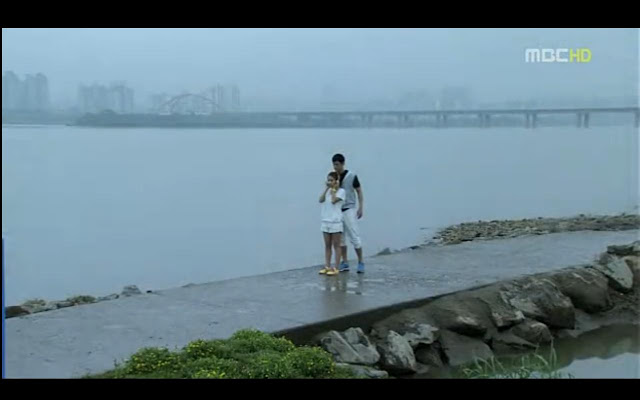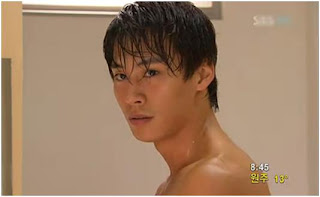This was a good year for me with Korean Dramas. I began watching dramas during the fall of 2010, by winter I discovered that not all k-dramas are worth watching, and by spring that it’s ok not to finish something (except veggies- you must always finish eating those). So, I decided to first knock off those dramas I have not completed before discussing my loves and hates.
 |
| A Thousand Kisses (they meet :) |
On the other hand, I dropped A Thousand Kisses after my favorite, adorable couple got together. I found myself fast-forwarding through the main couples storyline in order to get to the secondary couple of the older, emotionless man (Ryu Jin once againJ) and the lead’s adorable younger sister. Once they married, I moved on to other shows, but I might return again to finish if I find myself with an abundance of time on my hands. I watched about twenty episodes of Can You Hear My Heart and the finale. I adored the beginning of this drama. I can’t even state how much I loved the acting at the beginning, but the story began to lose me after awhile. I blame it on the main actresses mushroom hair style and overacting. Mostly, I loved the men in this drama (and the Grandma). I plan to watch more of Bride of the Sun someday, but right now there’s so much dialogue that I can’t follow along. One of these days someone will sub it and I will finally figure out what’s going on. Until then, I wait. The other shows I’ve started but not finished are:
Lie To Me- you can only kiss so much, although the brother made me happy for awhile.
The Musical- fantastic beginning, but became dull. If I hear that it picks up again, I may still finish it.
Paradise Ranch- lost interest after two episodes
Manny- mehh, nobody takes nannying that seriously.
You’ve Fallen For Me- cute, but I wanted better (yet, oh how the drummer was my fave!)
And now, for the shows I watched through their entirety. Sign was my very first show that I started watching raw (without subtitles) because I just couldn’t handle not knowing what was going to happen. I think that may be how I rate dramas. If I start watching a drama raw, it must be good. I am so glad that it aired at the beginning of the semester, because I am practically positively certain that my grades would have plummeted from my level of addiction. The last two episodes had me bawling my eyes out. They killed him. I still can’t believe they killed him. This is also the reason I vowed never to watch another show until it had finished airing and I could check out the ending just to make sure the hero made it out alive. Yeah, that lasted long.
City Hunter is next on this list. Not because it aired next or anything but because the psychopathic, murderous, evil woman from Sign played such a warm sympathetic, veterinarian/hero-patcher-upper in it. This aired right after finals, so I had a lot of time to devote to it. The opening episodes were gorgeous and evoked such emotion that I was easily hooked. It didn’t let up throughout the entire season, and my only gripe is that they killed the prosecutor. Good guys should not die (see above review). Speaking of good guys dying, Killer K was amazing. Tons of people died and I’m pretty much ok with it. I knew the high-school boy and the ahjussi wouldn’t make it, and I wouldn’t have written it any other way. I think that’s a good measure of whether something is really good or not- would I have written it differently and could I imagine anyone else in that role. Killer K was beautifully stylized and occasionally nuanced enough that I might actually watch it again sometime. I suppose that being only three episodes helped.
What I will not watch again is the kerfluffle that was Spy Myung Wol. I did finish the series, but that was because I was watching it with my mother online and she hadn’t yet figured out how to watch it on her own. She has since mastered the concept J. I do feel apologetic towards her though, because that was her very first k-drama and she was totally invested in the characters. We followed it up with last year’s Pasta, which she loved, and then with My Princess. She has yet to finish it, but I’ve noticed I’m enjoying it more this time around. My Princess is just that bubbly, happy drama that reminds you of your childhood fairy tales or The Princess Diaries, which was magical. My other happy place in k-dramaland this year was Dream High. Oh, to be super young, pretty and talented! Sometimes I watch my favorite bits and pieces from this one just to make me smile again. Like, everytime the lady teacher pulls out that hairclip thinking Eom Ki Joon is going to ask her out. I giggle.
I get the same kind of giggles watching Flower Boy Ramyun Shop, but I’m not quite current on that show as I am actually pushing it aside for a future rainy day while I spend my time watching Brain and Ten, but mostly Brain. He smolders, he broods, and when he smiles, I cry a little. That man, Dr. Lee Kang Hoon, is wreaking havoc on my brain (pun totally intended). It’s traditional, nothing new, and a medical drama to boot (a weakness of mine). I started watching it because Shin Ha Kyun and Jung Jin Young were both in Guns and Talks which may be my all time favorite Korean movie. This show though is all Shin Ha Kyun’s. I almost bolded his name, because he is an entity of his own. I know this show is drawing comparisons to White Tower, but I haven’t talked myself into watching that one, so for me, there is no point of comparison. The other actors are all fine, and I don’t have any problems with the script, music, or directing. For the most point, it’s nothing to write home about…but then it is. From the first time his eyes followed Choi Jung Won as she observed his surgery, I knew I was hooked. What’s more romantic than a guy being totally aware of a girl while she is completely oblivious. When I say totally aware, I don’t mean all lovey-dovey at all. I buy the romance because he sells it. The second lead guy started out all perfect and then slowly shows his weak underbelly, and we start to realize why our heroine won’t pick him. He kind of has crazy eyes that make me think he’s going to do something dastardly pretty soon (if you watched Penthouse Elephant, he’s in that and you’ll see what I mean). The supporting actors are all perfect in their roles, with Im Ji-Eun as the head nurse being my next favorite in the acting department. I almost wish she was the love interest as her interactions with Shin Ha Kyun are spot on. I hope to high heavens that this show ends well. If they kill him….
My other current show is Ten, with Vampire Prosecutor wrapping at the end of this week. I have a thing for crime procedurals, as evidenced by the fact that I also watched Poseidon and Crime Squad. I enjoyed Crime Squad. It’s the kind of show that was meant to have a spinoff or sequel. The two main leads were excellent with a bit of funny supporting characters thrown in here and there. It could’ve have been better, the dead daughter and guilt issues didn't always make sense (sometimes I felt like the writers forgot which drama they were in) but I would watch it again. Poseidon, not so much. I liked the first few episodes but then it got lost and I’m still not sure how. I have the feeling that those involved were suffering from the same predicament. I felt bad, 'cause it reminds me of all those teachers who know every student's name- on paper. If you asked them out of context, they couldn't be certain if the kid was actually in their classroom. What? You've never met that teacher? What I should say is that the characters were just that- characters...single dimension role-playing, individuals. For a show that had so much death and sadness, shouldn't I have been provoked to tears at least once? I watched it till the bitter end, continuously hoping for better, but it never really did. Vampire Prosecutor is a totally different ballgame. It’s fun, dark, and something I would actually watch with others. The same cannot be said about most k-dramas I watch J. I like the interplay between the characters, and I’m always a sucker for surrogate/work/office family relationships. The actors make me forget that they are acting, they form a cohesive picture, the writing makes sense, the directing is delightful, and the romance is subtle. It sort of sucks you in like Buffy and Bones, and leave you wishing for season two...please. And then there’s Ten. Whoever does the art directing or lighting or whatever it’s called deserves commendation. This thing is beautiful. Unfortunately, no one seems to be in a hurry to sub it, so I can’t always prove that what I think is taking place is actually taking place. For sure, it’s a crime drama with loops, twists, turns, and the occasional freak out (me that is). It’s dark and artsy. I just wish I knew what they were saying.
On the non-criminal side of k-dramas this year, I also watched 49 Days, Secret Garden, Romance Town, and The Greatest Love. 49 Days was beautiful. Kang Ha’s love was beautiful, Jung Il-Woo was beautiful, the music was beautiful…and then they took every hope and tear they gave me and smashed it to bits. I knew the Schedular would have to stay dead, but to have our heroine regain consciousness before dying a few days later was just too cruel drama gods. It didn’t bother me as much as Sign did, but still, really? Secret Garden and The Greatest Love gave me similar vibes. Flashy, commercial, and totally addictive. My favorite moment from Secret Garden was the foam kiss…and Hyun Bin putting on a bra…and driving into the rain to swap bodies…who am I kidding, I loved it all. Romance Town was my crack of the year. It was like It’s A Mad Mad Mad Mad World meets Gosford Park- but not British, or dark, or that incredibly funny. But, for me, it hit all the right notes.
This wasn’t an uber fantastic year for dramas (I have watched a bunch from previous years) but it wasn’t a failure either. Some dramas made me weep, others bored me to tears, and still others made me laugh. Here’s hoping next year brings me dramas even better!







